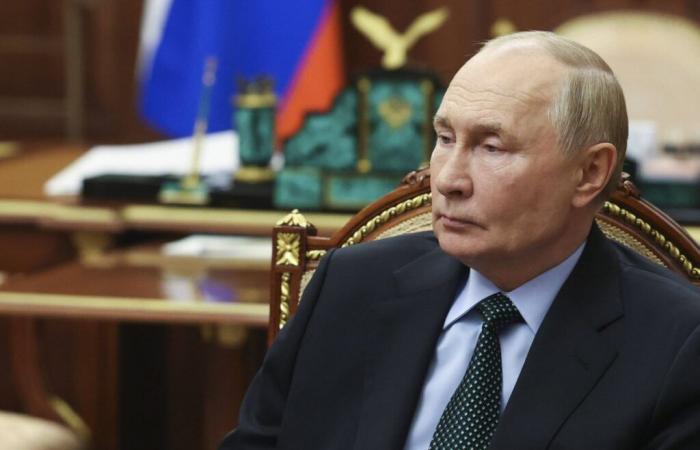The “special operation” against Ukraine should have been completed in three or four days and the Russian tankers who left Belarus had taken their parade uniforms in their tanks for the victory parade in the streets of kyiv. The conflict has now lasted more than 1,000 days and has transformed into a war of attrition with an exorbitant human cost for Ukraine – where at least 12,000 civilians have been killed – but also for the Russian aggressor who already lost nearly 200,000 men, ten times more than during the Afghan war.
Despite the rantings of the Kremlin strongman and his henchmen, Russia is far, very far, from winning. After the first days of the offensive followed by an operational debacle in the face of Ukrainian resistance, Russia lost in the fall of 2022 a good part of the areas conquered six months earlier, notably in the regions of Kherson and Kharkiv. It has since reorganized and modernized its army and established itself in an efficient war economy. But despite the resources deployed and immense losses on the Donbass fronts, estimated by Western intelligence services at some 1,700 men per day, killed or seriously injured, its forces are advancing very little, an average of 15 km² per day.
Read alsoVladimir Putin, indestructible goes to war
Who would have imagined at the dawn of February 24, 2022 that the Russian army would be defeated in this way? Probably the only ones who believed in it were the Ukrainians and their president Volodymyr Zelensky, who became the man symbol of the resistance, responding to Joe Biden's proposal to evacuate him to Poland: “I need ammo, not a taxi.”
It's already a globalized war
This first great war of the 21st century, carried out with 20th century methods in the name of imperial visions dating from the 19th century, came to remind Europeans of the fragility of what they considered until now to be the most notable success of the community project, that of having forever banished armed conflict between States of the Old Continent. The shock was immense and three years later, while the conflict is bogged down, its aftershocks continue to be felt, including far from the steppes of Donbass.
Read alsoWhy the war in Ukraine is just a prelude for Putin's Russia
It is already a globalized war whose metastases extend to the Middle East, with Iran increasingly linked to Russia which supplies it with drones and especially to the Far East with the direct involvement of North Korea who sent at least 10,000 men to help on the ground a Russian army short of cannon fodder in the name of a “vigorous friendship” sealed in June 2024 by a mutual defense agreement between Vladimir Putin and Kim Jong Un.
This internationalization of the conflict ultimately prompted Joe Biden to give the green light for kyiv's use of ATACMS missiles for strikes deeper into Russian territory, over a distance of some 300 kilometers, in order to destroy munitions depots, command centers, groupings of troops, but after validation of the targets by the United States.
A new deal with the election of Donald Trump
The other big turning point is the election of Donald Trump who promised to resolve “conflict in twenty-four hours”through direct negotiation with Vladimir Putin which risks being at the expense of kyiv. The new Republican president threatened several times during his campaign to cut support for Ukraine and arms deliveries. We must not forget, however, that during his first term, Donald Trump, unlike his predecessor Barack Obama, agreed to arm Ukraine, in particular by providing it with formidable Javeline anti-tank missiles and reinforced by more than 30,000 men. American military strength in Eastern Europe.
Read alsoTrump facing the war in Ukraine: the moment of truth for Europeans
Furthermore, in the very heterogeneous team that will take power, the two positions most directly linked to foreign policy and security are respectively occupied by Marco Rubio and Mike Waltz, old-style Republicans certainly convinced that the priority is to face the Chinese threat but well aware that a defeat of Ukraine could only encourage the ambitions of Xi Jin Ping and the Iranian mullahs.
This new situation, with the prospect of peace negotiations next winter, fuels a certain defeatism within the Twenty-Seven, even if European leaders, starting with the president of the commission Ursula von der Leyen or the French president recall loud and clear that support for Ukraine will continue as long as necessary.
Ukraine did not lose the war, and this is already a great victory
This conflict is certainly existential for Ukraine, but war fatigue is very real. We do not know the number of military losses but they number in the tens of thousands in a country three times less populated than Russia. The percentage of Ukrainians opposed to any territorial concession in exchange for peace is falling steadily, although it is still around 60%.
And the bitterness is palpable towards Westerners, and first and foremost the Americans who have always delivered weapons too late and in insufficient numbers. “The Biden administration has been too timid, paralyzed by the fear of a Russian defeat. Particularly in the fall of 2022, when we were able to repel the Russians. We would then have needed extremely rapid assistance to complete the work,” underlines Daria Kaleniuk of the anti-corruption center and a leading figure in civil society.
The fact remains that if Ukraine did not win the war, it did not lose it and that in itself is already a great victory. Russian failure is obvious even if the Kremlin's propaganda continues to blare, too often relayed both in the South and in the West by complacent or blind intellectuals, these “useful idiots” as Lenin once nicknamed them.
Vladimir Putin achieved none of the goals he set for himself
In almost three years of conflict, Vladimir Putin has not achieved any of the objectives he had set for himself. His war aims were variable and confused. In July 2021, he claimed that “Russians and Ukrainians in fact form a single people occupying the same spiritual and historical space”. This negation of the Ukrainian nation was a warning. Since then, its territorial claims have become more limited. In addition to Crimea annexed in the spring of 2014, in 2022 he proclaimed the integration into Russia of four “oblast” (departments) in eastern Ukraine: Donetsk, Luhansk, Zaporizhia and Kherson. The first two had already been largely in the hands of pro-Russian rebels since 2014; the other two are still essentially under kyiv's control and would remain so if there were to be a ceasefire freezing the current front lines.
Read alsoUkraine: Why we must already think about the war after
The master of the Kremlin claimed to want to “denazify” Ukraine, even though its president is of Jewish origin, but with his “special operation” he sparked a national surge to face the invasion which swept away and made inaudible the few political forces favorable to compromises with Russia.
With the EU and NATO, the process has begun
The geopolitical toll of Putin's war is even more distressing compared to his original intentions. He wanted to block Ukraine's path to NATO and the European Union. The Twenty-Seven, even those generally most reluctant to enlarge towards the east like France, accepted the candidacy of Ukraine as well as that of small Moldova and opened accession negotiations in June 2023. They will be long but from now on it is obvious to all the Member States that the route of the eastern border of the Union is in eastern Ukraine.
Certainly the integration of Ukraine into NATO is not on the agenda, at least in the immediate future due in particular to the opposition of the United States and Germany, but the process is initiated with the signing of bilateral agreements. In one way or another Ukraine will be associated with NATO structures and the security guarantees that it embodies even if Putin still hopes to forbid it.
He wanted to stop the eastward expansion of the Atlantic Alliance, the attack on Ukraine prompted Sweden and Finland to abandon their traditional neutrality to join this organization. Now the Baltic is a NATO lake with the exception of the small fraction of Russian coastline in the far east. It is the same for the Black Sea where the Russian fleet suffered setback after setback because of Ukrainian naval drones, losing more than a third of its units without being able to replace them due to the blocking of the straits to any passage of ships from the belligerent countries. by Turkey. The country, since the start of the conflict, has applied the Montreux agreements of 1936 to the letter. If Putin can boast of support from many of the southern countries that he received with great fanfare for a Brics summit in Kazan , he can hardly leave Russia because he is the subject of an arrest warrant for war crimes from the International Criminal Court for illegal deportations of Ukrainian children.
Russia, a country in an “economy of death”
Despite appearances, time is not on the Kremlin master's side. Certainly the economic sanctions imposed by the West have not had the desired effect and many southern countries, including those which voted at the UN to condemn Russian aggression, are not applying them. Russia sells its oil to India and China but the dynamism of the Russian economy is only apparent, swollen by massive orders to the military-industrial apparatus in a country which has moved into a war economy.
Read alsoAgathe Demarais: “The impact of sanctions against Russia is a slow poison”
And just as much in what the economist Vladislav Inozemtsev, who has since taken refuge in the West, calls a “economy of death”. The family of a 35-year-old man who fought in Ukraine for a year before being killed on the battlefield receives, between his pay and bonuses related to his death, approximately 14.5 million rubles, or The equivalent of $150,000. More than he could have earned in his entire life. It is a massive transfer of money to the poorest areas of the country which provide the volunteers to make up for the losses. An average of 20,000 new volunteers are needed per month. This constant increase in recruitment bonuses also reflects the growing difficulties of recruitment. Vladimir Putin has not yet won the war, quite the contrary. One more reason to do everything to help the Ukrainians in the coming weeks so that they do not unduly take their place at the negotiating table.






